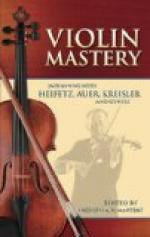“My experiences as a ‘concertmaster’? I have played with Weingartner; Saint-Saens (whose amiability to me, when he first visited this country, I recall with pleasure); Gustav Mahler, Tschaikovsky, Safonoff, Seidel, Bauer, and Walter Damrosch, whose friend and associate I have been for the last twenty-two years. He is a wonderful man, many-sided and versatile; a notably fine pianist; and playing chamber music with him during successive summers is numbered among my pleasantest recollections.
“In speaking of concertos some time ago, I forgot to mention one work well worth studying. This is the Russian Mlynarski’s concerto in D, which I played with the Russian Symphony Orchestra some eight years ago for the first time in this country, as well as a fine ’Romance and Caprice’ by Rubinstein.
“Is the music a concertmaster is called upon to play always violinistic? Far from it. Symphonic music—in as much as the concertmaster is concerned, is usually not idiomatic violin music. Richard Strauss’s violin concerto can really be played by the violinist. The obbligatos in his symphonies are a very different matter; they go beyond accepted technical boundaries. With Stravinsky it is the same. The violin obbligato in Rimsky-Korsakov’s Scheherazade, though, is real violin music. Debussy and Ravel are most subtle; they call for a particularly good ear, since the harmonic balance of their music is very delicate. The concertmaster has to develop his own interpretations, subject, of course, to the conductor’s ideas.
VIOLIN MASTERY
“Violin Mastery? It means to me complete control of the fingerboard, a being at home in every position, absolute sureness of fingering, absolute equality of tone under all circumstances. I remember Ysaye playing Tschaikovsky’s Serenade Melancolique, and using a fingering for certain passages which I liked very much. I asked him to give it to me in detail, but he merely laughed and said: ’I’d like to, but I cannot, because I really do not remember which fingers I used!’ That is mastery—a control so complete that fingering was unconscious, and the interpretation of the thought was all that was in the artist’s mind! Sevcik’s ‘complete technical mastery’ is after all not perfect, since it represents mechanical and not mental control.”
XIX
TOSCHA SEIDEL
HOW TO STUDY
Toscha Seidel, though one of the more recent of the young Russian violinists who represent the fruition of Professor Auer’s formative gifts, has, to quote H.F. Peyser, “the transcendental technic observed in the greatest pupils of his master, a command of mechanism which makes the rough places so plain that the traces of their roughness are hidden to the unpracticed eye.” He commenced to study the violin seriously at the age of seven in Odessa, his natal town, with Max Fiedemann, an Auer pupil. A year and a half later Alexander Fiedemann heard him play a De Beriot concerto in public, and induced him to study at the Stern Conservatory in Berlin, with Brodsky, a pupil of Joachim, with whom he remained for two years.




